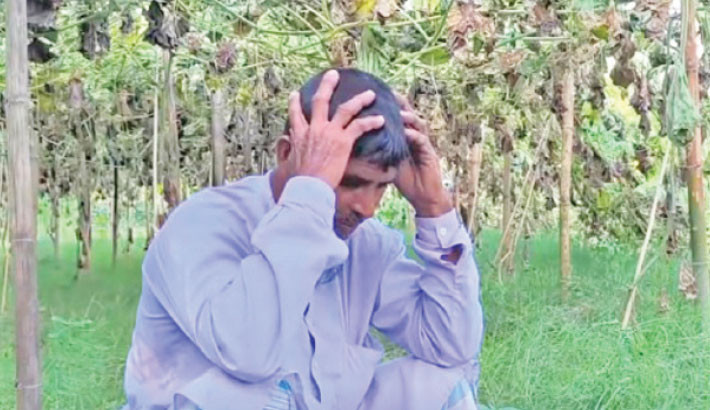
When Alauddin Madbar of Joynagar union under Zajira upazila in Shariatpur took Tk2 lakh in loans from microcredit institutions to cultivate vegetables on leased land, he expected to recover his investment through a good harvest.
Unfortunately, on Thursday night, his hopes were shattered. Unknown miscreants uprooted 1,800 papaya and 250 gourd saplings and cut down over 1,000 gourds, causing losses of around Tk3.5 lakh.
Alauddin suspects a neighbour with whom he has a land dispute and has filed a complaint with the Zajira police station.
His case is not an isolated one.
Across the country, farmers and fish cultivators are falling victim to deliberate acts of destruction – often linked to personal disputes or local rivalries.
Such incidents, taking place with alarming regularity, are inflicting serious financial losses on rural households and quietly hurting the national economy.
Officials from the Police Department, Department of Fisheries and Department of Agricultural Extension (DAE) admit that they have no official data on how often these incidents occur.
They say such crimes fall under the Penal Code 1860 and the Protection and Conservation of Fish Act 1950, but prosecutions rarely succeed due to a lack of witnesses and the difficulty of proving intent.
On 12 October, miscreants poisoned a pond owned by Nawshad Ali Master at Belpukur village under Ranisankail upazila in Thakurgaon, killing all the fish.
They also cut down two Mahogany trees along the pond bank, Nawshad said.
In Kurigram, miscreants destroyed paddy on about 150 decimals of land in Ulipur, Rajarhat and Bhurungamari between April and May, according to the DAE office in the district.
He said that the quick disposal of related cases could help deter such crimes.
Faruk Islam, a farmer from Gorai Munshipara in Ulipur, said his paddy on 55 decimals of land was destroyed with pesticide on 12 April and the perpetrators also stole a water pump from his field.
He later filed a case against unknown persons.
At Rajarhat upazila, Habibur Rahman’s paddy on 40 decimals of land was destroyed amid a land dispute. The farmer has also filed a case.
In Jamalpur, criminals killed fish in a pond on eight bighas of land owned by Sultan Bhoula and Saiful Islam at Sukhanagar Barokhoda village on 24 September by allegedly pouring poison.
Under Section 427 of the Penal Code 1860, causing damage worth Tk50 or more is punishable by up to two years in prison, a fine or both.
The Protection and Conservation of Fish Act 1950 also prohibits killing fish by poisoning, explosives or pollution, prescribing up to six months’ imprisonment and fines of up to Tk1,000.
Yet, proving such offences is difficult.
Borun Chandra Biswas, deputy director (Fisheries Resource Conservation Section) at the Department of Fisheries, told the Daily Sun, “If fish are poisoned, police must collect samples in the presence of an executive magistrate and conduct forensic tests. Even if poisoning is confirmed, witnesses are still required to identify the perpetrators.
Such crimes usually occur at night, when no one is around.”
“We need to rethink how to ensure quick and effective punishment for offenders,” he added.
Obaidur Rahman Mondol, director (Field Service Wing) of the DAE, said the department has no compiled data on such incidents.
“Sometimes our field officers mediate between victims and accused, but beyond that, we have little authority,” he said.
Assistant Inspector General of Police AHM Shahadat Hossain said there is no specific category in police records for such cases.
“These cases rarely succeed in court because of the lack of witnesses,” he said.
Supreme Court lawyer Ishtiak Ahmed said victims can file both criminal and civil cases.
“Criminal cases ensure punishment, while civil suits can help victims recover compensation,” he said, adding that proper enforcement of existing laws could significantly reduce such crimes.
Dr Tawohidul Haque, a crime analyst at Dhaka University, said law enforcement must take immediate action upon receiving reports.
“Crops and fish are vital to our economy. Their deliberate destruction directly undermines national productivity,” he said.
He urged the Fisheries and Agriculture departments to take preventive and awareness measures, warning that without such steps, farmers might lose motivation to continue cultivation.
The reporter can be reached at [email protected]
Edited by Harun Md Shahed Bin Naim


